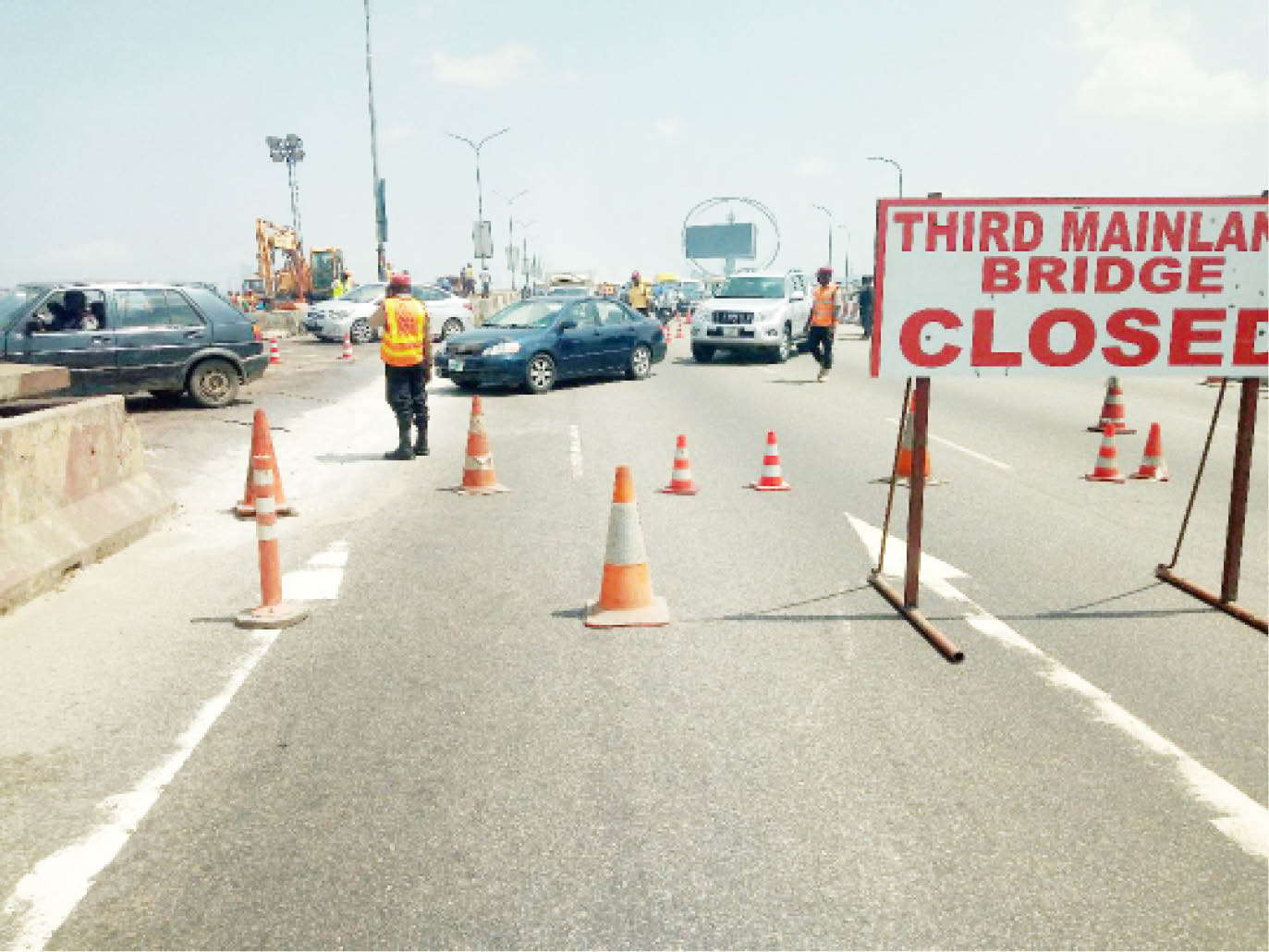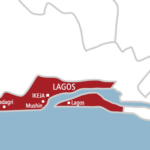In Lagos State, residents commuting between the Island and Mainland have been expressing tales of agony since the partial closure of the Third Mainland Bridge for maintenance on July 24, 2020.
The 11.8 kilometre bridge links key ends on the Mainland, like Yaba, Ikeja, Apapa-Oshodi expressway, Lagos-Ibadan expressway and many densely populated areas in the Lagos Island, Victoria Island, Ikoyi and Lekki, where multi-billion naira businesses are located. Traders and workers commute everyday from the Mainland to the Island, Ikoyi, Victoria Island and Lekki, to earn their living.
- 10 confirmed dead, 4 still missing in Lagos boat mishap
- AIB probes Turkish Airlines, MEA collision at Lagos airport
The first phase of the repair is focusing on the Oworonshoki end, inward Lagos Island in the morning, with traffic diversion from 12 midnight to 1pm, while there will be traffic diversion on Lagos Island inward Oworonshoki from 1pm to 12am.
The Lagos State commissioner for transportation, Dr Frederic Oladeinde, had announced before the repairs began, that the state government had done rehabilitation of alternative routes for motorists.
Oladeinde said Iddo inwards Carter Bridge, Market Road inwards Herbert Macaulay Road and Herbert Macaulay Road by Abeokuta Street, as well as the Herbert Macaulay by Cemetery and Apapa Road inwards Oyingbo had been fixed.
He advised motorists heading towards Ikeja and Ikorodu road from Osborne Road, Ikoyi, in the morning to make use of Carter Bridge to access Eko Bridge through Ijora Olopa. This, he said, would lead them through the Funsho Williams Avenue to Doman Long Bridge to Ikorodu, or to use Carter Bridge to Iddo through Oyingbo to Herbert Macaulay and Jibowu to link Ikorodu road.
Motorists coming from Victoria Island were advised to utilise Ozumba Mbadiwe Road to the Falomo bridge, through Alfred Rewane Road to Old Kingsway Road, Osborne, Ilubirin and Carter Bridge.
Another option for motorists is to take Bonny Camp to Independence Bridge and to Marina Bridge, through Apongbon to Eko Bridge, Ijora Olopa, Iddo and Oyingbo. In the afternoon, road users inbound Lagos Island were advised to use Ojota on Ikorodu road to access Funsho Williams Avenue through Eko Bridge/Apongbon axis, or to utilise Ikorodu road to access Fadeyi/Jibowu/Yaba and link Oyingbo-Iddo to Carter Bridge.
“Rehabilitation works are going on at the remaining routes highlighted for traffic diversions to enhance free traffic flow along the corridor during the rehabilitation,” Oladeinde noted, while advising motorists who did not have urgent assignments on the Island to avoid the area this period to discourage an influx of vehicular movements.
He also advised commuters to make use of water transportation by linking up with the various jetties in the metropolis for their trips.
But commuters complained that some of the alternative routes were not in good shape while repairs were ongoing on some. Our correspondent observed that some portions of the Ikorodu road connecting Yaba from Maryland, for instance, were characterised by large potholes, with the condition worsened by heavy downpour, leading to traffic jam.
Also, in March 2020, a section of Eko bridge, which is usually the go-to alternative, was closed for rehabilitation works on worn-out bearings noticed between the Alaka and Costain part, inward Apongbon. About four months after, the bridge is yet to be opened.
Residents who live on the Mainland but work or do business on the Island narrated that their commuting experiences had been traumatic since the closure of the bridge. They lamented that they had been spending more time and money getting to their destinations due to heavy traffic.
Some residents, who said they could not bear the daily rigour of that traffic, have decided to temporarily relocate to the Island, where they work or do business, until the end of the maintenance work.
A textile dealer at the Balogun market on the Lagos Island, Mrs Folashade Bello, pointed out that some of the inner streets that were made to serve the purpose of diversions were characterised by indiscriminate vehicle parking, locked gates and poor street lightings, among others.
A resident of Oshodi, on the Mainland, Mr Sulaiman Quadri, on Monday, July 27, left his home for work at Lekki Phase 1, but little did he know that he would not return home that day due to the gridlock the closure caused.
Quadri recounted, “My first experience was on the first working day after the closure. It was on a Monday, and I will say it was horrible. I had to do some urgent work in the office that Monday and stay back till 9pm. I usually take Uber or Taxify after close of business, but on that day, I was lost in the work I was doing, such that I never realised it was 9pm. When I wanted to order my ride, I got a notification that Uber/Taxify would close by 9pm, so I had no option than to go in public transport.
“Everything looked normal to me until I got to Ikoyi, where there was heavy traffic. I stopped and walked to Obalende, where I got another vehicle to Oshodi. The traffic from the Third Mainland Bridge was so serious that it had extended to Ikoyi. Unfortunately, the vehicle I boarded broke down on the bridge, and before the driver could get someone to assist him move it to Iyana-Oworo, it took some time and we got to Iyana-Oworo by 11.30pm.
At the time, the policemen had started barricading the road. They were doing their own and asking uncooperative drivers to park at Iyana-Oworo bus stop. At Iyana-Oworo, there was no other commercial vehicle and Uber/Taxify were not working, so I had to sit at Iyana-Oworo bus stop till Tuesday morning. I eventually got a vehicle to Oshodi at 4am. That was my first experience. It was crazy,” he lamented.
Mr Quadri said the “nasty” experience continued on Wednesday as he spent over three hours in traffic after close of work. “Our experiences in the traffic here can lead to depression if allowed to continue. The repair should have been done during the total lockdown occasioned by the COVID-19 pandemic,’’ he added.
He advised the government to create more awareness about Lagos ferry operations, and urged traffic officers to do more work in managing the traffic. He also stressed the need to open up more alternative channels and make the people to be aware of the channels. “With the partial closure, most commuters still go through the horrifying traffic, and that is happening because nobody sees any alternative to that bridge,” he said.
Another Lagos resident living on the Mainland and working on the Island, who gave his name simply as Gboyega, said, “I don’t think this is the best time to renovate the bridge because the alternative routes are only 20 per cent ready.
Unlike Ikorodu road, which is relatively on the Fadeyi-Ojuelagba-Stadium, inward Island, the bridge that links to the Island has been on lockdown from Alaka bridge since February. The ongoing construction of the Eko bridge at the Costain end has been stopped without completing the second side. Costain and Oyingbo are the alternative routes to the Island and there is always traffic there,” he lamented.
He advised that an urgent action be taken on the Alaka/Costain bridge, adding that the trailers/tankers parking on the road to Apapa should be relocated to ease traffic.
In addition to the pain caused by the hours spent in traffic daily, motorists also have traffic robbers to contend with.
Sharing his experience on how the closure has affected the security situation in the state, a resident, Mr Kayode Alade, said, “As expected, the closure of the bridge has put more pressure on vehicular movement along Ikorodu road. Last Sunday night was one of horror. There was a heavy traffic and we had spent hours on the road. At Alaka, Surulere, on Funso Willams Avenue, from the other side of the road, about 12 men marched towards the traffic. By then, our snail speed movement had come to a standstill. In a jiffy, they struck. They took on the vehicles randomly. They didn’t plead with motorists to wind down glasses or surrender keys. They helped themselves by smashing the glasses with hammer and glittering cutlasses.
The exercise lasted for few minutes, but they left many families in tears. A young couple were not so lucky. They were not killed but the operation left their one-and–half-year-old baby in distress. At a tender age, the small girl saw guns pointed at her parents as she woke up with the noise of the smashed glasses. While other victims were counting their losses, a few of us moved towards the distressed family to help. There were particles of glasses on the body of the innocent girl.
A young man who struggled with the bad boys escaped death by the whiskers. He struggled with the guys and escaped, leaving his ‘visitors’ in the car and the engine running. In a few seconds, he returned to face them. According to him, he didn’t know they had guns and thought he could overpower them with help from some of us. Of course, they welcomed him with guns and pounced on him. The man holding the gun was persuaded by others not to shoot. They left with his wallet, phones and other gadgets. At the end, five vehicles were vandalised on the spot. Many victims lost wrist watches, gold accessories, phones, wallets containing Automated Teller Machine (ATM) and identity cards and cash.”
Motorists have been blaming both the state and federal governments for not being proactive enough to foresee the security threat that could come with the new traffic regime.
When contacted on the security situation, the police public relations officer, Lagos State command, Superintendent Bala Elkana, told Daily Trust Saturday that the police had deployed massively to the Third Mainland Bridge and alternative routes. He also noted that the police were working closely with its sister agencies to manage the situation.
“We also have surveillance patrol men in plain clothes deployed to the roads. We have deployed motorcycles patrolling the roads to help avert criminal acts. There is no cause for alarm as we are still monitoring and intensifying surveillance around the areas and other parts of Lagos,” he assured.
To mitigate the effects of the closure, the Lagos sector commander of the Federal Road Safety Commission (FRSC), Ogungbemide Olusegun, said, “Despite the alternative routes, many people still ply the Third Mainland Bridge, especially now that the traffic is heading towards the Mainland. The alternative routes are there and traffic is heavy, but our men are there to assist.
“When we had our meeting, it was concluded that we should still allow members of the public to use the Third Mainland at peak periods. So, between 12 midnight and 1pm, all vehicles heading towards the Lagos Island have unhindered access to the bridge. Between 1pm and 12midnight, those who are going to the Mainland from the Island also have unhindered access to the bridge. We have made provisions for 70 to 80 per cent of the normal number of vehicles that ply the bridge.
“Naturally, the gridlock on the bridge is high at the peak period. It is not out of place to advise road users to make use of the waterways and make use of BRT buses, rather than everyone using their vehicles at the same time, in order to reduce the volume of traffic.”
Olusegun pleaded with motorists to cooperate with the officials who are assisting them navigate the routes. “We are on top of the situation. People should understand and endure as it is a situation that will end after six months. All we need is their collaboration and understanding,” he said.
The Lagos State Government has also assured residents of minimal burden during the closure period.
Governor Babajide Sanwo-Olu appealed to residents to exercise patience and bear the discomfort that would be experienced during the period. The closure, he said, was inevitable, following physical deterioration observed on the structure after an integrity test conducted by the Federal Government.
He admitted that the closure would bring pain, but noted that the development was necessary to prevent any disaster that may result from the total collapse of the infrastructure.
He also promised that men of the Lagos State Traffic Management Authority (LASTMA) would constantly be on the road with their federal counterparts to ensure a seamless movement of vehicles.
“The state government has carried out improvement work on alternative routes mapped out for diversions,” he said.

 Join Daily Trust WhatsApp Community For Quick Access To News and Happenings Around You.
Join Daily Trust WhatsApp Community For Quick Access To News and Happenings Around You.


